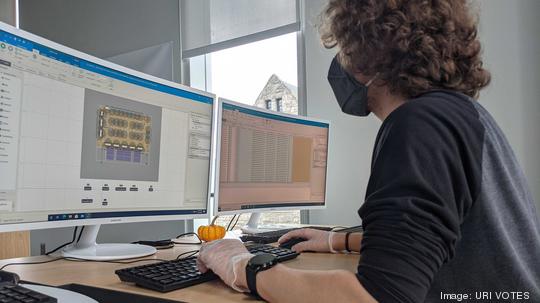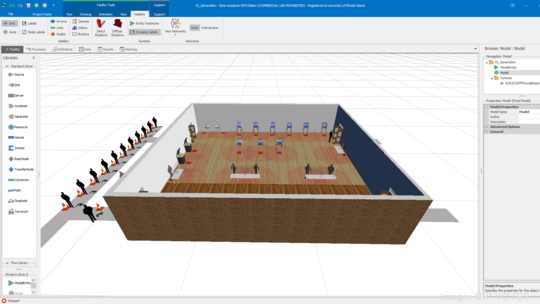
In the months leading up to the election that would ultimately result in President-elect Joe Biden taking office tomorrow, a team of researchers led by the University of Rhode Island's Gretchen Macht was hard at work.
Macht and her team had for years been working to make voting more efficient as part of a project called URI Voter OperaTions and Election Systems, or URI Votes. Established in 2017, URI VOTES aims to use data and technological advances to help shorten voter wait times and improve voting procedures.
Macht is not a political scientist, but an assistant professor in URI's College of Engineering, using her expertise to examine the layout and protocols of polling places on behalf of election authorities across the U.S.
This election season, the Covid-19 pandemic made the group's work more challenging.
"When the pandemic hit, we had a lot more constraints than the system had ever been used to," Macht said. "It just took the problem we were already trying to solve and made it that much more complex and different. What we were able to do was work with the Rhode Island Board of Elections and Department of State and take the environment we virtually constructed in 2016, then add all those constraints so we could effectively vote in person and be safe."
Macht points out that while Rhode Island is the nation's smallest state geographically, it is also the second-most densely populated. In ordinary times, Macht and her team advise changes in order to fit as many voters into a polling place as possible and get them through the process quickly. Now, they had to add in new variables. Fewer people were allowed into a room at any given time. Distance had to be maintained in line and inside polling places. Election workers had to keep their distance from voters who needed assistance.
To address this, URI VOTES created virtual models of polling places. They then ran a variety of different scenarios to figure out which one effectively balanced safety and efficiency before reporting back to officials as they set up the sites.
"The more we can understand the variation, the more that we can simulate, the more we can basically help elected officials understand what is happening before it happens," Macht said.

In 2020, URI VOTES worked with officials in New Jersey, Philadelphia, Michigan, Los Angeles County, Rhode Island and Lancaster and Douglas counties in Nebraska. Working with faculty and students from Auburn University and the University of Nebraska-Lincoln, Macht’s research group collected data in Rhode Island, Nebraska and Los Angeles on Election Day.
Macht is continuing to have conversations with elected officials who might need their expertise in the future. As the Covid-19 pandemic rages, she thinks it's likely her team's new knowledge will be pertinent.
"This may not be our last election day during a pandemic," Macht said. "There is a lot of opportunity to use this data and for everybody to learn from it and grow."



